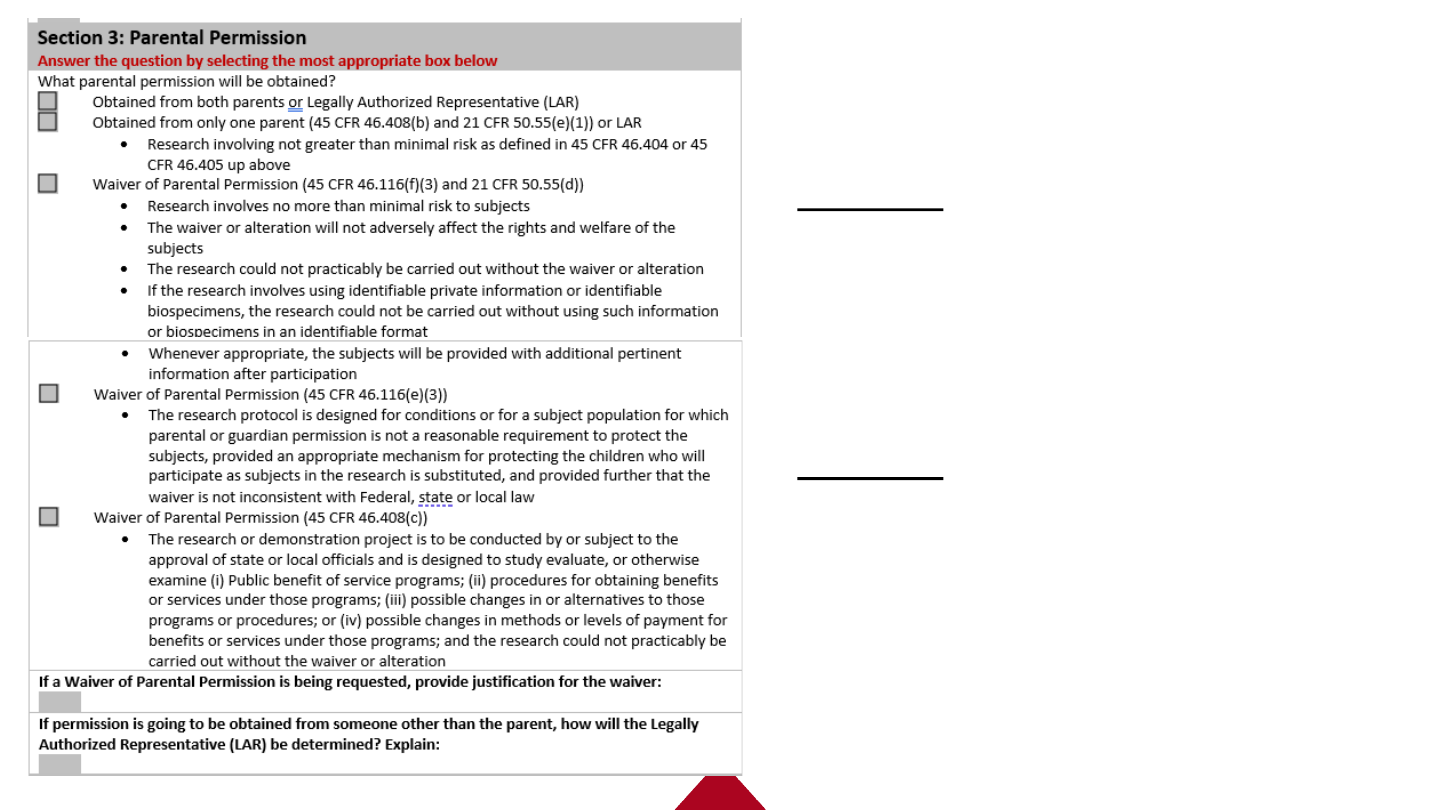
Informed Consent & Waivers
Human Subjects Protection Program (HSPP)

2
1. Ethical & Regulatory Foundation of Human Subjects Research & IRB Review
2. A Step-by-Step Guide to Successful IRB Submissions
3. Informed Consents & Waivers (October)
4. Let’s Talk About Research Data (November)
5. Your Study is Approved, Now What? (December)
Fall 2022 HSPP Workshop Series
HSPP Training: https://research.arizona.edu/compliance/human-subjects-
protection-program/hspp-training/irb-training-opportunities

3
Agenda
• Overview
• Consent Types
• Required Elements
• Additional Requirements
• UA Templates
• Uploading ICFs to eIRB
• Waivers
• Resources
• Q&A

4
1. Non-Written Consent Documentation
2. Exculpatory Language #1
3. Exculpatory Language #2
4. Waivers
5. Belmont Report Principles

5
Overview

6
Informed Consent Ethical Background
The Nuremberg Code
The voluntary consent of the human subject is absolutely essential.
Declaration Of Helsinki (Sections 25-32)
Participation by individuals capable of giving informed consent as subjects in medical research must be
voluntary. Although it may be appropriate to consult family members or community leaders, no
individual capable of giving informed consent may be enrolled in a research study unless he or she freely
agrees.
The Belmont Report (Principle of Respect for Persons)
Respect for persons requires that subjects, to the degree that they are capable, be given the opportunity
to choose what should or should not happen to them. This opportunity is provided when adequate
standards for informed consent are satisfied.

45CFR46.111 Criteria for IRB approval of research.
• Informed consent will be sought from each prospective subject or the
subject's LAR; for children Parental Permission/Assent is obtained.
• Informed consent will be appropriately documented or waived.
45CFR46.116
General Requirements for Informed Consent.
• Includes Waiver or alteration of consent.
45CFR46.117
Documentation of informed consent.
• Includes Waiver of signed informed consent.
The NEW Rule (2018) streamlined consents, but it also added more
consent elements (i.e., future use, commercial profit, sharing of results, and
whole genome sequencing).
Common Rule Requirements

8
Informed Consent Process
Informed Consent Process
• Provide sufficient
information to potential
participants about study
details so they can make
an informed decision.
• Use visual aids,
information sheets,
and/or videos to promote
understanding.
• Answer questions and
assess understanding.
• Always Required,
regardless of method.
• A document or an
alternate method that
confirms the agreement
to participate in research.
• Should be appropriate for
the participant, and
should consider the age,
maturity, cognitive status,
and language level of a
potential participant.
• Consent requirements can
be waived in certain
situations.
• Starts with recruitment.
• It’s continuing and
ongoing.
• Provide participants new
information that could
affect participation.
• Re-assess willingness to
participate.
• Reconsenting or an
addendum might be
required.

9
Considerations to Enhance Understanding
• Participants should have ample time to read the consent and
adequate opportunity to ask questions.
• If the participant has difficulty reading the consent, it should be
read to them.
• If enrolling participants with impaired decision-making ability,
when possible, explain to the extent of their ability to understand,
request some sort of affirmation, and document consent from their
Legally Authorized Repetitive (LAR).
• Translate documents to the language the participant is most
comfortable with to receive medical/research related information.
Short Forms can be used for less than Five (5) participants,
translated documents are needed beyond that number.
• For long/complex/online consents use attention checks or a short
survey to assess understanding.

10
NO “Exculpatory Language"
No informed consent, whether oral or written, may include any exculpatory language
through which the subject is made to waive or appear to waive any of the
subject's legal rights, or releases or appears to release the investigator, the
sponsor, the institution, or its agents from liability for negligence. [45 CFR 46.116]
• ICF Template Injury Section: “This, however, does not waive your rights in the
event of negligence. If you suffer an injury from participating in this study, you
should seek treatment.”
• ICF Signature Section: “I am not giving up any legal rights by signing this form.”
HHSP Guidance on Exculpatory Language
https://www.hhs.gov/ohrp/regulations-and-policy/guidance/exculpatory-
language-in-informed-consent-documents/index.html

11
UA/Banner Template Language: “The University of Arizona and Banner-University
Medical Center have no funds set aside for the payment of treatment expenses for this
study.”
Zoom Poll Question & Answer

12
ICF Template Section: Will my specimens be sold for commercial
profits? Describe whether subjects will or will not share in any commercial
profit from the use of their biospecimens, even if identifiers are removed.
Sample Language: “The information/specimens may be used in this research
or other research and shared with other organizations. You will not share in
any commercial value or other compensation from products developed using
the information/specimens.”
Zoom Poll Question & Answer

13
Use the latest ICF Templates.
Include all required elements of informed consent, and if applicable, all
the additional elements of informed consent.
Written in a language understandable to the participant.
Written at a 6
th
to 8
th
grade level, or an appropriate reading level.
Add and update the version date to ensure that the most recent IRB
approved version is used.
Submit as a Microsoft Word document (.doc or .docx) so it can be edited
during pre-review and so that the approval stamp can be applied.
Use track-changes when submitting revisions.
UA Informed Consent Guidelines
HSPP Informed Consent Guidance
https://research.arizona.edu/sites/default/files/Informed%20Consen
t%20v2022-08.pdf

14
Consent Types

15
Types of Informed Consent
• Written Informed Consent
• Participant signs and dates a consent form (usually in person, and a signed/dated copy
is given to participant).
• The individual obtaining consent also signs and dates the consent document.
• The signature of a Legally Authorized Representative (LAR) is needed for participants
with impaired decision-making capacity.
• Verbal Informed Consent “Disclosure”
• An IRB approved Oral Script is used.
• Participant verbally agrees to participate.
• Signature is waived by the IRB.
• Electronic Informed Consent
• REDCap, Qualtrics (e-signature or checkbox)
OR
• Waiver of Informed Consent
• If the regulatory criteria are met, the IRB can waive informed consent.

16
Unwritten, Oral, or Electronic Informed Consent also require documentation.
Consider ways in which to verify human subject participants’ oral consent if required
to produce verification. This can be accomplished in a variety of ways, including:
• Audio recording
• Video recording
• Photographs
• Drawings
• Witnesses
• Field Notes
Non-Written Consent Documentation

17
“Consenting” Children (<18 Years of Age)
• Use age-appropriate language.
• The parent/guardian needs to be
Consented first.
• The child needs to be Assented second.
• IRB typically waives Assent for
children 7 years old and younger.
• The child can refuse participation.
Parental Permission, agreement of parent(s) or
guardian(s) is required for all human subject's
research involving minors unless waived by the IRB.
Minor Assent, a child's affirmative agreement to
participate in research, must also be obtained unless
waived by the IRB. Assent has to be affirmative, not
objecting is not the same as agreeing.
When the minor reaches the age of majority (age
18), they should be Consented as an adult to
continue participation.
HSPP Guidance Research Involving Children
https://research.arizona.edu/sites/default/file
s/Research%20Involving%20Children%20v20
21-09.pdf

18
Required Elements

19
(1) A statement that the study involves research, an explanation of the purposes of the research
and the expected duration of the subject’s participation, a description of the procedures to be
followed, and identification of any procedures that are experimental.
Required Elements of the Informed Consent
(45 CFR 46.116)
UA Template Language
Summary of the research (or Intro)
This is a consent form for participation in a research study.
Why is this study being done?
Explain the purpose of the study and a statement that the study involves research.
What will happen if I take part in this study?
Explain the procedures to be done. Specifically identify any procedures that are for research only.
Include:
• The probability for random assignment to each treatment
• The subject’s responsibilities
How long will I be in this study?
Explain the expected duration of the subject's participation.

20
(2) A description of any reasonably foreseeable risks or discomforts to the subject.
UA Template Language
What risks , side effects or discomforts can I expect from being in the study?
Explain any reasonably foreseeable risks or discomforts to the subjects because of participation or
procedures from the research. Explain, if applicable, that a particular treatment or procedure may
involve risks that are currently unknown or foreseeable.
Explain that if there are significant new findings that may impact a subject’s participation they will
be informed.
(3) A description of any benefits to the subject or to others that may reasonably be expected
from the research.
UA Template Language
What benefits can I expect from being in this study?
Explain any reasonably expected benefits to subject or others.
• When there is no intended clinical benefit to the subject, a statement to this effect
• Do not include statements of unproven claims of effectiveness or certainty of benefit, either
implicit or explicit
Required Elements #2 & #3

21
(4) A disclosure of appropriate alternative procedures or courses of treatment, if
any, that might be advantageous to the subject;
Required Element #4
UA Template Language

22
(5) A statement describing the extent, if any, to which confidentiality of
records identifying the subject will be maintained;
Required Element #5
UA Template Language
If the study is associated with Banner Health, also add the Banner
Gray Language in the UA/Banner Medical ICF.

23
(6) For research involving more than minimal risk, an explanation as to whether any
compensation and an explanation as to whether any medical treatments are available if
injury occurs and, if so, what they consist of, or where further information may be obtained;
Required Element #6
Additional Sample Language is included in the sidebar of the ICF template, and
UAHS/Banner might also edit the injury and compensation section.
UA Template Language

24
(7) An explanation of whom to contact for answers to pertinent questions about the research
and research subjects’ rights, and whom to contact in the event of a research-related injury to the
subject;
ICF Template:
Who can answer my questions about the study?
For questions, concerns, or complaints about the study you may contact ___________________.
For questions about your rights as a participant in this study or to discuss other study-related
concerns or complaints with someone who is not part of the research team, you may contact the
Human Subjects Protection Program Director at 520-626-8630 or online at
https://research.arizona.edu/compliance/human-subjects-protection-program.
For studies involving greater than minimal risk include : If you are injured as a result of
participating in this study or for questions about a study-related injury, you may contact
____________________.
Required Element #7

25
(8) A statement that participation is voluntary, refusal to participate will involve no
penalty or loss of benefits to which the subject is otherwise entitled, and the subject may
discontinue participation at any time without penalty or loss of benefits to which the subject is
otherwise entitled.
ICF Template
Can I stop being in the study?
Explain that participation is voluntary, refusal to participate will involve no penalty or loss of
benefits to which the subject is otherwise entitled, and the subject may discontinue
participation at any time without penalty or loss of benefits to which the subject is otherwise
entitled.
If applicable, explain what may happen and what procedures are required for orderly
withdrawal or termination if the subject leaves the study early, or is withdrawn from the study
by the researcher.
Sample Language: ” Your participation is voluntary. You do not need to participate in this
study. If you decide to take part in the study, you may leave the study at any time. No
matter what decision you make, there will be no penalty to you and you will not lose any of
your usual benefits. Your decision will not affect your future relationship with The University of
Arizona. If you are a student or employee at the University of Arizona, your decision will not
affect your grades or employment status.”
Required Element #8

26
Required Element #9
2018 New Common Rule Requirement:
(9) One of the following statements about any research that involves the collection of
identifiable private information or identifiable biospecimens:
UA Template Language
Will my data or specimens be stored for future research ?
The consent must
include either:
• A statement that identifiers will or will not [choose one] be removed from the private information or
biospecimens, and that after such removal, the information or biospecimens may be used for future research
studies without additional informed consent [Include a description of what information/specimens will be
stored and whom they will be shared with (both internal and outside the institution). Explain what research
may be conducted with these data/specimens - including unspecified future research, genetics, disease
specific, etc.]; or
• A statement that the identifiable information or biospecimen, even if identifiers are removed, will not be used,
or distributed for future research.

27
Additional Requirements

28
Additional Elements #1- #6
(1) A statement that the particular treatment or procedure may involve risks to the
subject (or to the embryo or fetus, if the subject is or may become pregnant) that are
currently unforeseeable (legal, financial, social, physical, or cultural harm).
(2) Anticipated circumstances under which the subject’s participation may be
terminated by the investigator without regard to the subject’s or the legally authorized
representative’s consent.
(3) Any additional costs to the subject that may result from participation in the research.
(4) The consequences of a subject’s decision to withdraw from the research and
procedures for orderly termination of participation by the subject.
(5) A statement that significant new findings developed during the course of the
research that may relate to the subject’s willingness to continue participation will be
provided to the subject.
(6) The approximate number of subjects involved in the study.

29
Additional Elements #7- #9
(7) For research involving biospecimens, a statement that the subject's biospecimens
(even if identifiers are removed) may be used for commercial profit and whether the subject
will or will not share in this commercial profit.
(8) A statement regarding whether clinically relevant research results, including
individual research results, will be disclosed to subjects, and if so, under what conditions.
(9) For research involving biospecimens, whether the research will (if known) or might
include whole genome sequencing (i.e., sequencing of a human germline or somatic
specimen with the intent to generate the genome or exome sequence of that specimen).
2018 New Common Rule Requirements:

30
UA Templates

31
Use the Correct Consent Template(s):
• Internally funded/non-funded Social Behavioral
ICF/Parental permission (v. Sept 2021)
• Externally funded Social Behavioral ICF/Parental
permission (v.2022_10)
• UA/Banner Medical ICF/Parental permission (required
for Banner; also includes Banner PHI) (v.2022_10)
UA Informed Consent Templates
HSPP ICF Templates https://research.arizona.edu/compliance/human-
subjects-protection-program/HSPP-forms/consent-templates
• Enforcement of New Templates Starts November 7th

32
Required Parts:
• UA Logo
• Version Date
• Regular text
• Summary of the Research
(>4pg ICF)
Customizable Parts:
• This form can be used as an
adult consent or parental
permission.
• Red text can be
removed/replaced
• Insert side bar comments as
applicable.
Externally Funded
Social Behavioral
ICF template

33
UA Medical ICF/Parental
Permission Template
Use this template for:
• Medical Research
• B-UMC Research
• When Biospecimens are involved
• When PHI is accessed
BH Required Parts:
• Banner Logo
• Barcode on pg1
• Banner Gray Language
Customizable Parts:
• Red text can be removed/replaced
• Insert side bar comments as applicable
• Helpful Hints:
• Submit the ICF as a MSWord document.
• Keep the version date on top updated.
• After approval, the consent will be PDFd
and the approval date will appear on
the bottom of the page.

34
• The consent addendum template should
be used when there is a new portion of a
research project that requires a
participants’ signature.
• The ICF Addendum should include the
following language: “This is a consent
addendum for research participation. It
contains important additional information
about this study and what to expect if
you participate (or continue to
participate). Please consider the
information carefully. Feel free to discuss
the information with your friends and
family and to ask questions before
making your decision about whether or
not to participate.
• The ICF Addendum template is
recommended, but it is not required.
UA ICF Addendum Template

36
Uploading to eIRB

37
Uploading the ICF in eIRB
Also upload the Oral Script & Translated Consent Documents to this section.
The Appendix for Waiver or Alteration of Consent or PHI is uploaded here.

38
Approval Letter Language:
“To document consent, use the
consent documents that were
approved and stamped by the
IRB. Go to the Documents tab
to download them.”
Use the Approved/Stamped ICF for Consenting

39
Waivers

40
In some cases, it may not be appropriate or possible to consent subjects. The
federal regulations have provisions for when consent can be waived.
An IRB may also approve a consent procedure that omits some, or alters some or
all, of the elements of informed consent; this is called a consent alteration.
Types of Waivers
• Waiver of Consent
• Alteration of Consent
• Waiver of Documentation of Consent (applies to the signature requirement)
Consent Waivers & Alterations

41
Also see FDA General Requirements for Informed Consent (21 CFR 50.20.)
The FDA does not have a Consent Waiver, but the Agency does allow for
an Exemption from Informed Consent for FDA-regulated planned
emergency research.
Use the Appendix for Exception from Informed Consent (EFIC)
when an
exception from informed consent is needed (21 CFR 50.24)
Planned Emergency Research is a systematic investigation of a condition experienced
by individuals in a setting where the emergency circumstances require prompt action and
generally provide insufficient time and opportunity to locate and obtain consent from each
subject's legally authorized representative (LAR). Planned emergency research involves
the prospective identification and enrollment of participants into a study.
FDA Requirements & Waivers

42
In order for the IRB to waive or alter consent, the IRB must find and document that:
(i) The research involves no more than minimal risk to the subjects;
(ii) The research could not practicably be carried out without the requested waiver or alteration;
(iii) If the research involves using identifiable private information or identifiable biospecimens, the
research could not practicably be carried out without using such information or biospecimens in an
identifiable format;
(iv) The waiver or alteration will not adversely affect the rights and welfare of the subjects; and
(v) Whenever appropriate, the subjects or legally authorized representatives will be provided with
additional pertinent information after participation.
Regulatory Criteria for Waivers

43
(1) The IRB may waive the requirement for the investigator to obtain a signed informed
consent form for some or all subjects if it finds any of the following:
(i) That the only record linking the subject and the research would be the informed consent
form and the principal risk would be potential harm resulting from a breach of confidentiality.
Each subject (or legally authorized representative) will be asked whether the subject wants
documentation linking the subject with the research, and the subject’s wishes will govern;
(ii) That the research presents no more than minimal risk of harm to subjects and involves no
procedures for which written consent is normally required outside of the research context; or
(iii) If the subjects or legally authorized representatives are members of a distinct cultural
group or community in which signing forms is not the norm, that the research presents no
more than minimal risk of harm to subjects and provided there is an appropriate alternative
mechanism for documenting that informed consent was obtained.
(2) In cases in which the documentation requirement is waived, the IRB may require the
investigator to provide subjects or legally authorized representatives with a written
statement regarding the research.
Waiver of Informed Consent Documentation
45CFR46.117(c)
The IRB also needs to review/approve the oral script and all participant facing materials.

44
Use this forms to request:
• Waiver of informed
consent (Section 1 A)
• Waiver of documentation
(Section 1B)
OR
• Alteration or waiver of
protected health
information (PHI)
(Section 2 A-C/Section 3).
Answer all questions
in each section
that you are requesting.

45
Waiver of ICF Documentation Section 1B

46
B. Record/Specimen Use - Indicate your source(s) of health information
Physician/clinic records
Interviews/questionnaires
Mental health records
Billing records
Lab, pathology and/or radiology results
Biological samples obtained from the subjects
Hospital/medical records (in- and out-patient)
Data previously collected for research purposes
Other; specify:
• Complete Section 2 for a Waiver of PHI to
access electronic medical records for
recruitment or research purposes.
• Check all that apply.
• Make sure this matches the PHI
information in the protocol.

47
Section 2 C
• Provide details about why
a waiver or alteration is
needed.
• For the list of individuals,
you can add a general
statement, i.e., “only
study personal listed on
the delegation log will
have access to this data
after all required training
and approvals are
completed.”
Section 3
• Signature is only needed if
a PHI waiver or alteration
is requested.

48
Complete the Appendix for
Children/Wards to request:
Section 3
• A waiver of one parent signature.
• Waiver of Parental Permission.
AND/OR
Section 4
• A Waiver of Child Assent

49
Waiver of Assent

50
• Complete the Appendix for Cognitively
Impaired Individuals to Request a
Waiver of Consent for Cognitively
Impaired Participants.
• This form needs to be filled out in
addition to the Appendix for Waiver or
Alteration of Consent/PHI.
• For more information see the HSPP
Guidance on Research Involving
Cognitively Impaired Adults
https://research.arizona.edu/sites/
default/files/Research%20Involving
%20Cognitively%20Impaired%20Ad
ults%20v2021-09.pdf
Cognitively Impaired
Appendix

51
Resources

52
• HSPP Forms:
https://research.arizona.edu/compliance/human-subjects-protection-
program/HSPP-forms
• HSPP Informed Consent Guidance
https://research.arizona.edu/sites/default/files/Informed%20Consent%20v2022-08.pdf
• HHS Informed Consent
https://www.hhs.gov/ohrp/regulations-and-
policy/guidance/informed-consent/index.html
• 45 CFR 46 Requirements
https://www.hhs.gov/ohrp/regulations-and-
policy/regulations/45-cfr-46/revised-common-rule-regulatory-text/index.html
• HHS Informed Consent Resources
https://www.hhs.gov/ohrp/regulations-and-
policy/regulations/45-cfr-46/revised-common-rule-regulatory-text/index.html#46.111
Resources

Stay in the Loop
55
Subscribe to the HSPP listserv:
• Send a blank email to: list@list.arizona.edu
• In the subject line, enter: subscribe UA-IRB Firstname Lastname
• Delete any signature line and/or confidentiality statement that you may
have in your e-mail.
Subscription Instructions: https://it.arizona.edu/documentation/how-
subscribe-and-unsubscribe-list.

56
• Non-Written Consent Documentation
• Exculpatory Language #1
• Exculpatory Language #2
• Waivers
• Belmont Report Principles

57
Q & A

Q1: What Kind of Consent or e-Signature is Required for
Online Minimum-Risk Studies?
58
• For certain activities, such as online surveys, a written or authenticated
electronic signature is not necessary.
• No names or other identifying information need to be collected.
• The regulations allow IRBs to waive the requirement to obtain a signature
on the consent form. This is called a waiver of documentation of informed
consent.
• One of three categories must apply to your study:

59
• First, have a clear plan for the consent process.
How will subjects access the consent document? How will subjects indicate consent?
Discuss on the IRB Protocol form.
• Ensure the consent form submitted to the IRB reflects the chosen method
for obtaining consent.
Instead of a signature block, include a prompt: "I have read this consent form and
agree to participate in this research study: ____“
• If an electronic signature is not possible, consider which of the three
categories for the waiver of documentation are most applicable.
You'll need to choose one and provide a rationale on HSPP Appendix for
Waiver/Alteration of Consent or PHI form.
Best Practices for Online/Unsigned Consent

Waiver of ICF Documentation Criteria
60
1. Is a signed consent form the only record that would link the subject to the research?
Is a loss of confidentiality the principal risk to subjects?
2. Does the study carry no more than minimal risk? Do study activities normally require
written consent outside the research context?
3. Does the study carry no more than minimal risk? Is the study population part of a
distinct cultural group or community in which written signatures are not the norm?

Best Practices Cont’d
61
• Remember that waiving the signature requirement is not the same as
waiving informed consent altogether. You will still need to present subjects with
a document containing the basic elements of informed consent.
• If your study involves deception or incomplete disclosure of the aims of the
research, the IRB will require you to provide a debriefing as well. The Informed
Consent section of the IRB Protocol form should explain how the debriefing will
be presented to subjects.
• The HSPP Guidance page now includes information on deception in research:
https://research.arizona.edu/sites/default/files/Deception%20Research%20v20
22-05%20NEW.pdf

Q2: What's the best way to incorporate information
about data sharing and future use into the consent?
62
The Consent language should reflect the information in the protocol, and vice versa.
Specifically,

Future Use Language for De-Identified Data
63
When a protocol includes future research use, the IRB requires the following:
• The anticipated sharing or future use should be described on in the consent
document.
• The consent should explain the potential uses in layman's terms.
For example, if you plan to store de-identified data for future research, we
recommend adding something like:
“Your de-identified samples and data will be stored for future unspecified research. This
data may be shared with researchers both inside and outside of the institution.”
If the data sharing is optional, use an opt-in or opt-out checkbox or initial line.

Sharing Identifiable Data
64
If you plan to share identifiable data, including audio or video recordings, the consent
should explain this as well. HSPP consent templates contain standard language that can be
adapted as appropriate:
• "Information that may identify you may be used for future research or shared with
another researcher for future research studies without additional consent. [Explain]“
• "Information that identifies you will only be used for future research or shared with
another researcher after obtaining your consent. [Explain]“
• Also consider adding an opt-in prompt. For example: "The research team may use or
share my information for other studies in the future: _____"

65
Will my data or specimens be stored for future research ?
The consent must include either:
• A statement that identifiers will or will not [choose one] be removed from the private information or biospecimens, and
that after such removal, the information or biospecimens may be used for future research studies without additional
informed consent [Include a description of what information/specimens will be stored and whom they will be shared
with (both internal and outside the institution). Explain what research may be conducted with these data/specimens -
including unspecified future research, genetics, disease specific, etc.]; or
• A statement that the identifiable information or biospecimen, even if identifiers are removed, will not be used, or
distributed for future research.
If your study
is funded by the NIH or another agency that requires a Data Management Plan, relevant information from your
Data Management Plan will need to be included in this section.
Future Use Language for NIH/Federal Funding
NIH sample consent language can be found here: https://osp.od.nih.gov/wp-
content/uploads/Informed-Consent-Resource-for-Secondary-Research-with-Data-and-
Biospecimens.pdf.

66
Optional/NOT-Optional Future Use of PHI Language
Use this language when future research is NOT optional
Also, by signing this form you are authorizing and permitting uses and/or disclosures of your PHI for future research purposes (e.g.,
future studies) as described in this document.
Use this language when there is additional optional research
Optional Research Activity
Optional research activity is part of this project. If you choose to participate in this optional activity your PHI shall be included for this
optional activity.
By initialing the line below, you agree to allow your PHI to be used and/or disclosed for the optional research activity referenced
above. _____ Initials
Use this language when future research is optional
Future Use of PHI
Future research activity is part of this project. If you choose to participate in the future research activity your PHI will be included in this
future research activity.
By initialing the line below, you agree to allow your information to be used and/or disclosed for the optional future research
referenced above. _______ Initials

67
Q3: What consent template is needed when conducting research in
collaboration with Banner Health ?
The University of Arizona-Banner Health Consent Form is required when
conducting research at any of the Banner-University of Arizona Medical Center
sites (e.g., Banner-University Medical Center Tucson, South and Phoenix
campuses) or using Banner Health patients.
“This consent form is for medical research, including collection of biospecimens
or research that will access HIPAA protected information. Delete the RED text
prior to submitting this form to the IRB. Required language is in regular text.
Additional language, as appropriate, are in comments.
Grey language is required by Banner if conducting research at B-UMC.”

68
If recruiting Banner staff for participation in research, include the
required Banner employee addendum in addition to the normal research
consent.
If you are using a consent disclosure, you may insert the following language into
your disclosure form in place of the Banner employee addendum consent.
“Completion of the survey and participation in this research project is voluntary. If
you complete the survey you are confirming that you voluntarily consent to
participate in this research project and you understand that participation in this
project is not a condition of employment at Banner Health. You may complete this
survey at work. If you elect to complete the survey on your own time, you will not
be paid for your time spent on completing the survey. ”
Banner ICF Question Continued
Collaborative Activities with Banner Health HSPP Webpage
https://research.arizona.edu/compliance/human-subjects-protection-
program/collaborative-activities-banner-health

Questions?



